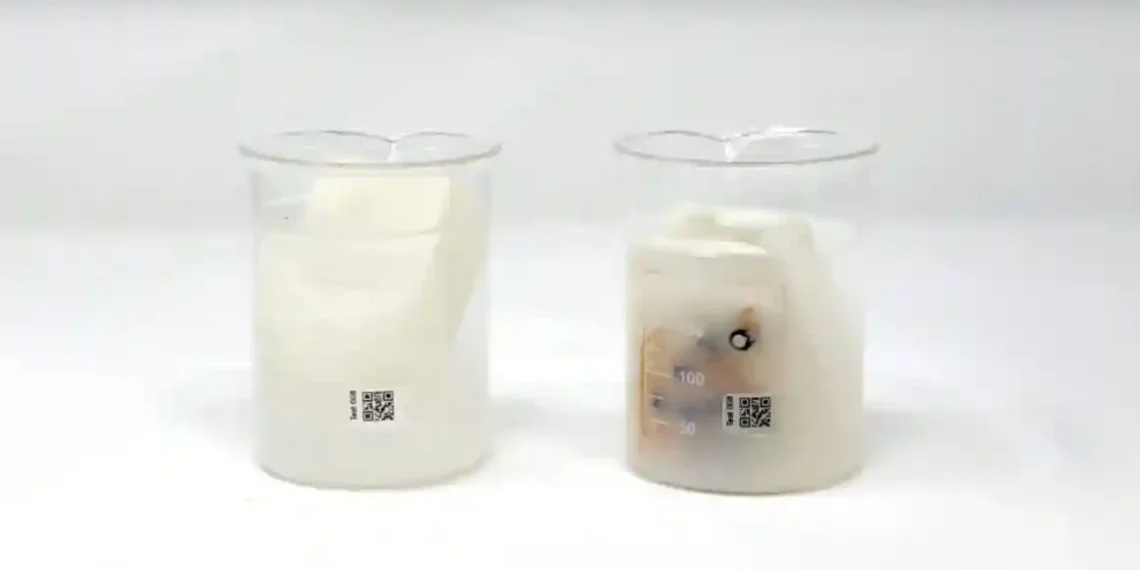The Growing E-Waste Crisis: Could Aquafade Be the Solution?
As our reliance on electronics — from smartphones to computers — continues to soar, so does the environmental burden of e-waste. In 2022 alone, a staggering 62 million tons of e-waste were generated globally. To put that in perspective, it’s enough to fill 1.5 million trucks, lined up bumper-to-bumper, that would stretch all the way around the globe. Yet, only a fraction of this e-waste is recycled, with most ending up in landfills or incinerators, releasing toxic chemicals into the environment and threatening human health.
Aside from the environmental toll, e-waste is also costing us billions of dollars in recoverable resources. The UN reports that $62 billion worth of valuable materials, like rare earth metals, are lost every year as e-waste is improperly disposed of. Despite the clear need for better recycling systems, only about 1% of the demand for these critical materials is met through e-waste recycling.
With e-waste growing five times faster than recycling efforts, finding new, innovative solutions is more urgent than ever. Enter Aquafade — a revolutionary new material that could help tackle this growing problem.
Aquafade is a fully water-soluble plastic designed to make the recycling of electronic products easier, faster, and more efficient. When submerged in water, this innovative plastic dissolves completely in about six hours, making it possible to recover the most valuable components of a device — such as its circuitry — without the need for complex and labor-intensive disassembly.
Samuel Wangsaputra, one of Aquafade’s inventors, explains the concept: “For most electronics, the real headache during recycling is the disassembly process. It’s time-consuming, costly, and often done by hand. Aquafade simplifies this by decentralizing the process, making it easy for people to recycle products at home.”
The idea for Aquafade came from an unlikely source: a dishwasher pod. While washing dishes one night, Wangsaputra noticed the water-soluble film around the pod. He wondered where it went after dissolving in water. Intrigued, he tested it and watched as the film completely disappeared, sparking the idea for Aquafade.
Teaming up with Joon Sang Lee, his co-inventor and founder of Pentaform (a UK-based startup that makes low-cost computers), Wangsaputra worked with material scientists at Imperial College London to develop Aquafade. Together, they created a material made from PVOH (polyvinyl alcohol), a biodegradable, food-safe polymer. The goal: to create a material that could dissolve in water, yet still meet the durability standards of modern electronics.
Aquafade’s key innovation lies in its ability to make electronics easier to break down for recycling. The material is applied as an outer coating on electronic devices, which is waterproof and durable enough to withstand everyday use. However, once the device is no longer needed, a simple twist of a screw is enough to trigger the dissolution process. The plastic casing dissolves in water within hours, leaving behind a milky solution and the valuable parts of the device — ready to be recovered and reused.
This solution could significantly reduce the environmental impact of e-waste by making the recycling process simpler and more effective. Moreover, the dissolved plastic is biodegradable and can safely decompose in sewage systems.
The first commercial use of Aquafade will likely be in the form of LED wristbands used at concerts. Thousands of these wristbands are discarded after just one use, contributing to the growing waste problem. Wangsaputra and Lee are in talks with major wristband manufacturers to bring Aquafade to this market.
Beyond electronics, Aquafade could be used in a wide range of other products that rely on hard plastic shells, such as luggage, car interiors, furniture, and even watches. The potential applications for this material are vast, and the creators are exploring licensing opportunities with other manufacturers.
While Aquafade holds promise, it’s not without its challenges. Experts, including Peter Edwards, Emeritus Professor of Inorganic Chemistry at the University of Oxford, have raised concerns about the long-term environmental impact. Will the dissolved plastic ultimately break down into microplastics? Wangsaputra and his team acknowledge that more research is needed to determine the full biodegradability of Aquafade over time.
Michael Shaver, a Professor of Polymer Science at the University of Manchester, shares similar concerns about the sustainability of the material. The waterproof coating, in particular, raises questions about how it will degrade over time and whether it will meet the stringent durability standards required for modern electronics. As Shaver notes, “The devil is in the details” — ensuring that Aquafade meets the technical specifications for different types of electronics could be one of the biggest hurdles to widespread adoption.
For now, Aquafade is about twice the cost of traditional plastic like ABS, but its inventors are optimistic that mass production will drive costs down. At just 5-10% more than conventional plastics, the material’s price is relatively small in comparison to the overall cost of an electronic product.
While Aquafade is still in its early stages, it represents a bold step forward in the fight against e-waste. If the material can live up to its promise and overcome technical hurdles, it could play a key role in reducing electronic waste, recovering valuable resources, and making electronics more sustainable in the long run.
As the world continues to grapple with the growing issue of e-waste, innovations like Aquafade offer hope that we can find better, more efficient ways to recycle and reuse the materials that power our devices. The future of e-waste management could very well depend on solutions like these — ones that not only solve an environmental crisis but also change the way we think about product life cycles.
This article was rewritten by JournosNews.com based on verified reporting from trusted sources. The content has been independently reviewed, fact-checked, and edited for accuracy, neutrality, tone, and global readability in accordance with Google News and AdSense standards.
All opinions, quotes, or statements from contributors, experts, or sourced organizations do not necessarily reflect the views of JournosNews.com. JournosNews.com maintains full editorial independence from any external funders, sponsors, or organizations.
Stay informed with JournosNews.com — your trusted source for verified global reporting and in-depth analysis. Follow us on Google News, BlueSky, and X for real-time updates.














